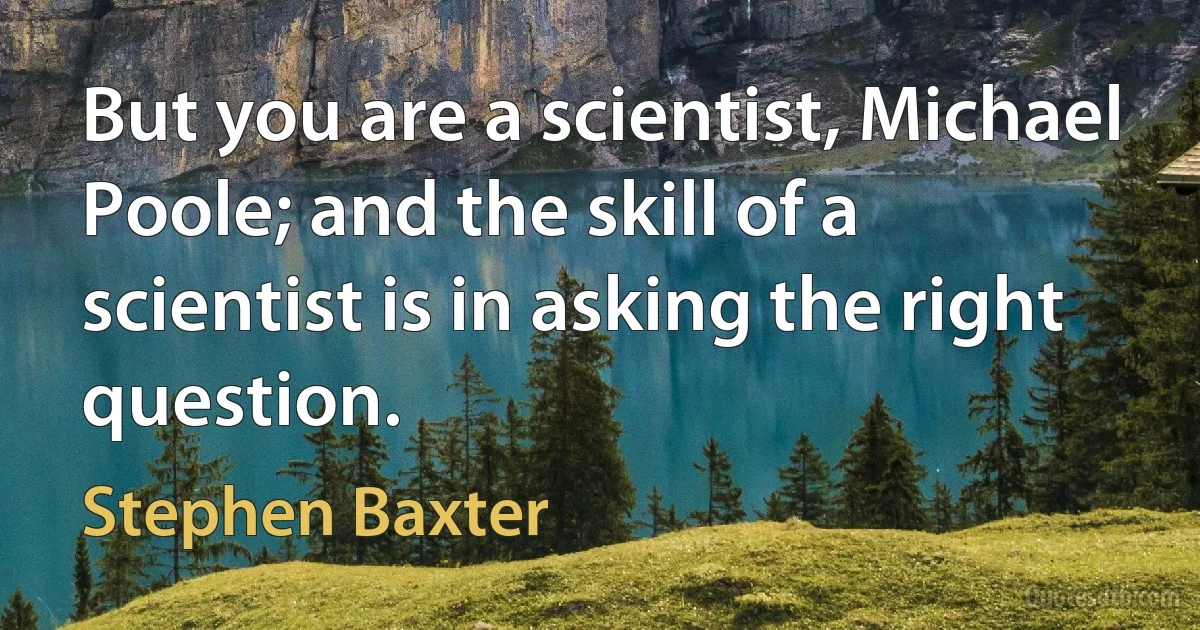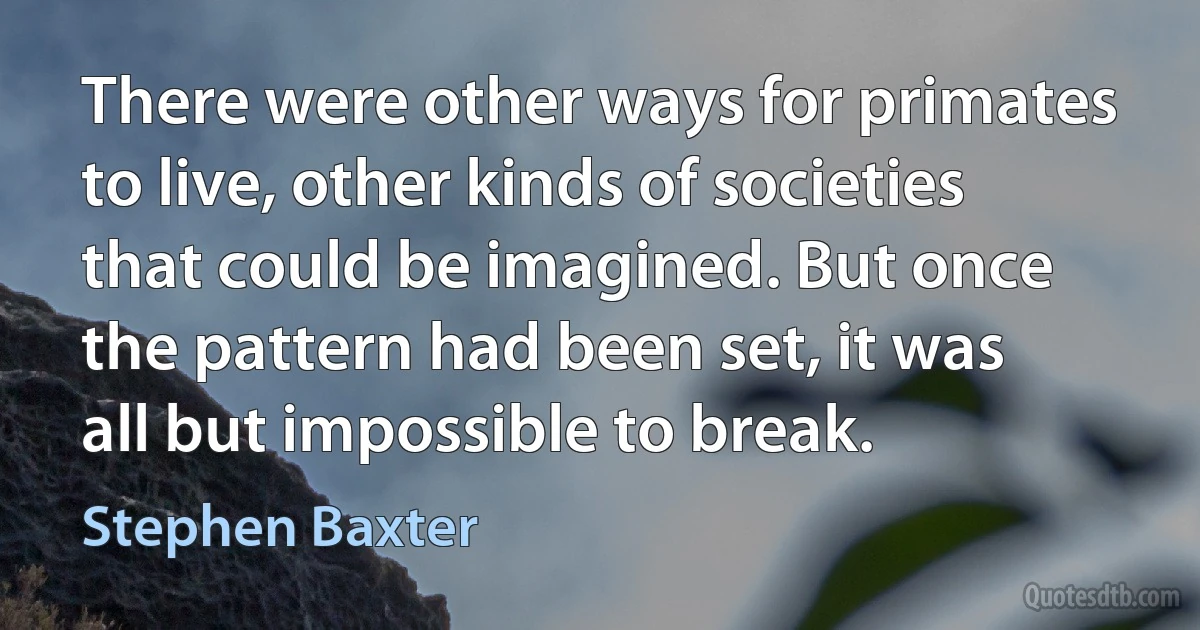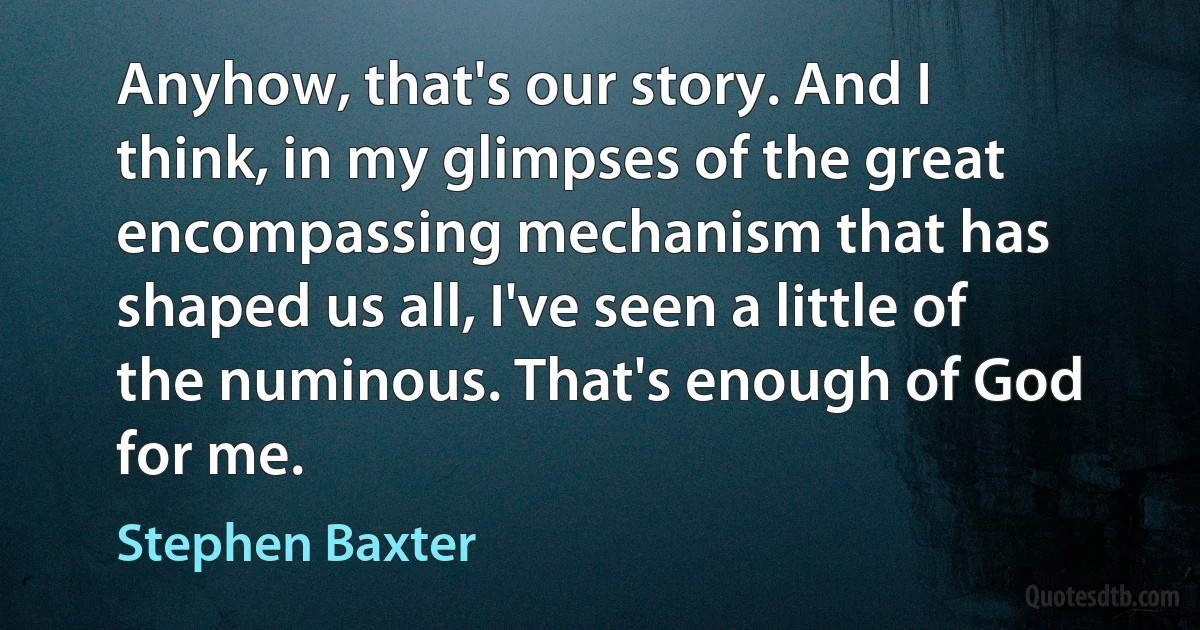Stephen Baxter quotes - page 2
Despite his friendship with Adam Smith, he believed in government intervention in agriculture, as it was too important to be left to market forces and chance: ‘The husbandman maintains the nation in all its ease, its affluence and its splendour,' he wrote. But farmers too had a responsibility for the public good. Rotation of crops, ensuring equal acreages of different crops at any given time, would help keep prices stable.

Stephen Baxter
On the longest of timescales, over millions of years, the workings of chance defied human intuition. Humans were equipped with a subjective consciousness of risk and improbability suitable for creatures with a lifespan of less than a century or so. Event that came much less frequently than that-such as asteroid impacts-were place, in human minds, in the category not of rare, but of never. But the impacts happened even so, and to a creature with a lifespan of, say, ten million years, would not have seemed so improbable at all.
Given enough time even such unlikely events as ocean crossings from Africa to South America would inevitably occur, over and again, and would shape the destiny of life.

Stephen Baxter
It (i. e., agriculture) was the most profound revolution in hominid living since Homo erectus had left the forest and committed themselves to the savannah. Compared to this phase shift, the advances of the future-even genetic engineering-were details. There would never be so significant a change again, not until humans themselves disappeared from the planet.

Stephen Baxter
His overriding lesson for thinkers like Hutton was that scientists, even those occupied by an apparently ‘concrete' discipline like geology, need to be careful not just about what they claim to know but also about how they claim to know it. Human reason is a fragile thing and prone to be overthrown by suggestibility.

Stephen Baxter
A growing belief that behind every event lay intention-be it an evil thought in the mind of another, or the benevolent whim of a god in the sky-was perhaps inevitable in creatures with an innate understanding of causality. If you were smart enough to make multicomponent tools, you eventually came to believe in gods, the end of all causal chains. There would be costs, of course. In the future, to serve their new gods and shamans, the people would have to sacrifice much: time, wealth, even the right to have children. Sometimes they would even have to lay down their lives. But the payback was that they no longer had to be afraid of dying.

Stephen Baxter
In the last centuries of the empire, educational standards and literacy had fallen. In the dulled heads of the masses, distracted by cheap food and the barbaric spectacles of the coliseums, the values on which Rome had been founded and the ancient rationalism of the Greeks had been replaced by mysticism and superstition. It was-Honorius had explained to his pupil-as if a whole culture was losing its mind. People were forgetting how to think, and soon they would forget they had forgotten. And, to Honorius's thinking, Christianity only exacerbated that problem.
"You know, Augustine warned us that belief in the old myths was fading-even a century and a half ago, as the dogma of the Christians took root. And with the loss of the myths, so vanishes the learning of a thousand years, which are codified in those myths, and the monolithic dogmas of the Church will snuff out rational inquiry for ten more centuries. The light is fading, Athalric.”.

Stephen Baxter
Nothing mankind had done in its short and bloody history had made the slightest bit of difference to this patient geographical realignment.
Meanwhile the Earth, left to its own devices, had deployed a variety of healing mechanisms, physical, chemical, biological, and geological, to recover from the devastating interventions of its human inhabitants. Air pollutants had been broken up by sunlight and dispersed. Bog ore had absorbed much metallic waste. Vegetation had recolonized abandoned landscapes, roots breaking up concrete and asphalt, overgrowing ditches and canals. Erosion by wind and water had caused the final collapse of the last structures, washing it all into sand.
Meanwhile the relentless processes of variation and selection had worked to fill an empty world.

Stephen Baxter



